Top Rankings
Tea Area School District 41-5 ranks among the top 20% of public school district in South Dakota for:
Category
Attribute
Graduation Rate
Highest graduation rate (Top 1%)
Community Size
Largest student body (number of students) (Top 1%)
For the 2025 school year, there is 1 public middle school serving 556 students in Tea Area School District 41-5. This district's average middle testing ranking is 8/10, which is in the top 30% of public middle schools in South Dakota.
Public Middle School in Tea Area School District 41-5 have an average math proficiency score of 47% (versus the South Dakota public middle school average of 39%), and reading proficiency score of 60% (versus the 49% statewide average).
Minority enrollment is 17% of the student body (majority Hispanic and Black), which is less than the South Dakota public middle school average of 42% (majority American Indian).
Overview
This School District
This State (SD)
# Schools
6 Schools
297 Schools
# Students
2,408 Students
40,141 Students
# Teachers
145 Teachers
2,999 Teachers
Student : Teacher Ratio
17:1
17:1
District Rank
Tea Area School District 41-5, which is ranked within the top 30% of all 146 school districts in South Dakota (based off of combined math and reading proficiency testing data) for the 2021-2022 school year.
The school district's graduation rate of 95% has increased from 85-89% over five school years.
Overall District Rank
#35 out of 148 school districts
(Top 30%)
(Top 30%)
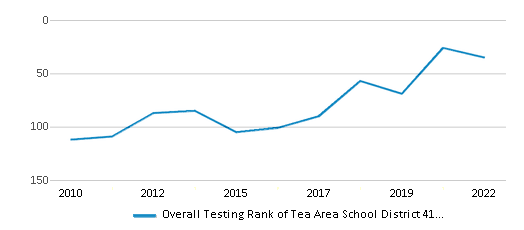
Math Test Scores (% Proficient)
52%
42%
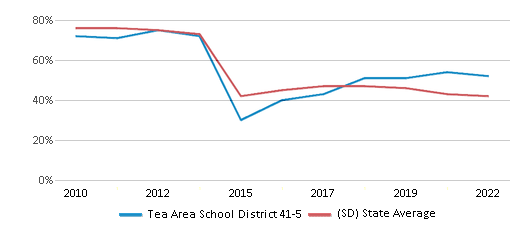
Reading/Language Arts Test Scores (% Proficient)
61%
51%
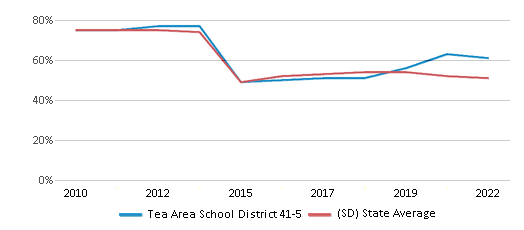
Science Test Scores (% Proficient)
44%
42%
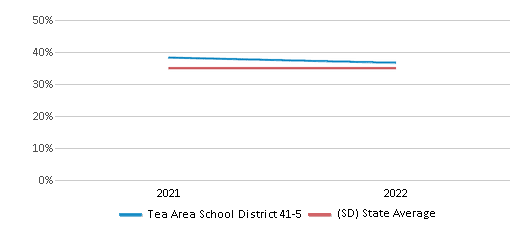
Graduation Rate
≥95%
82%
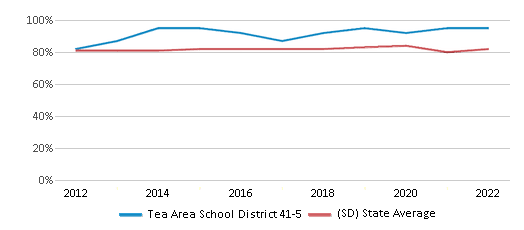
Students by Ethnicity:
Diversity Score
0.34
0.59
# American Indian Students
24 Students
10,455 Students
% American Indian Students
1%
26%
# Asian Students
29 Students
519 Students
% Asian Students
1%
1%
# Hispanic Students
160 Students
2,703 Students
% Hispanic Students
7%
7%
# Black Students
93 Students
1,024 Students
% Black Students
4%
3%
# White Students
1,954 Students
23,358 Students
% White Students
81%
58%
# Hawaiian Students
2 Students
46 Students
% Hawaiian Students
n/a
n/a
# Two or more races Students
146 Students
2,036 Students
% of Two or more races Students
6%
5%
Students by Grade:
# Students in PK Grade:
-
174
# Students in K Grade:
242
896
# Students in 1st Grade:
210
903
# Students in 2nd Grade:
194
918
# Students in 3rd Grade:
163
750
# Students in 4th Grade:
182
793
# Students in 5th Grade:
191
1,598
# Students in 6th Grade:
186
9,664
# Students in 7th Grade:
175
11,058
# Students in 8th Grade:
195
11,237
# Students in 9th Grade:
186
674
# Students in 10th Grade:
163
578
# Students in 11th Grade:
173
481
# Students in 12th Grade:
148
417
# Ungraded Students:
-
-
District Revenue and Spending
The revenue/student of $9,644 in this school district is less than the state median of $13,121. The school district revenue/student has declined by 15% over four school years.
The school district's spending/student of $8,419 is less than the state median of $12,623. The school district spending/student has declined by 15% over four school years.
Total Revenue
$23 MM
$1,916 MM
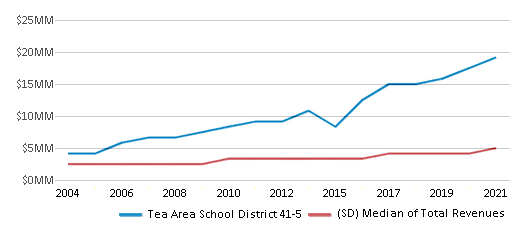
Spending
$20 MM
$1,844 MM
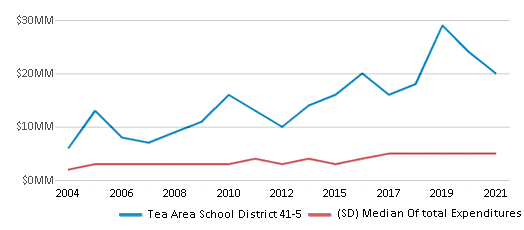
Revenue / Student
$9,644
$13,121
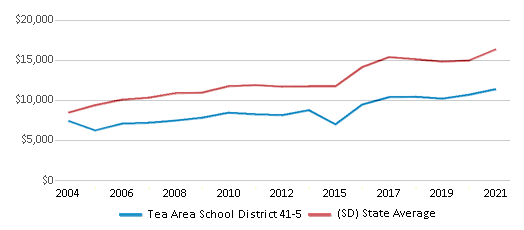
Spending / Student
$8,419
$12,623
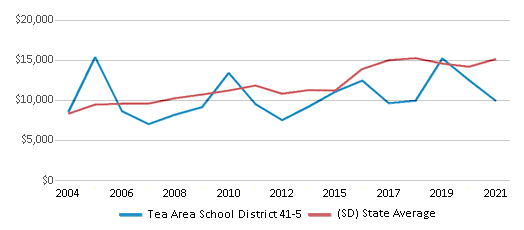
Best Tea Area School District 41-5 Public Middle Schools (2025)
School
(Math and Reading Proficiency)
(Math and Reading Proficiency)
Location
Grades
Students
Rank: #11.
Tea Area Middle School - 02
(Math: 47% | Reading: 60%)
Rank:
Rank:
7/
Top 50%10
515 W Brian St
Tea, SD 57064
(605) 498-2700
Tea, SD 57064
(605) 498-2700
Grades: 6-8
| 556 students
Recent Articles

Year-Round Or Traditional Schedule?
Which is more appropriate for your child? A year-round attendance schedule or traditional schedule? We look at the pros and cons.

Why You Should Encourage Your Child to Join a Sports Team
Participating in team sports has a great many benefits for children, there is no doubt. In this article you will learn what those benefits are.

White Students are Now the Minority in U.S. Public Schools
Increasing birth rates among immigrant families from Asia and Central and South America, combined with lower birth rates among white families, means that for the first time in history, public school students in the United States are majority-minority. This shift in demographics poses difficulties for schools as they work to accommodate children of varying language abilities and socio-economic backgrounds.





